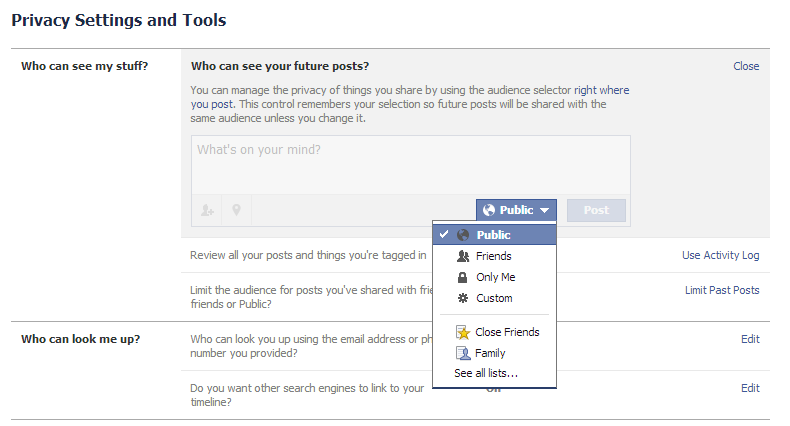Once upon a time, you could make sweeping changes to your privacy settings with a single click of the mouse. Those times are now history – but by knowing all the different aspects of privacy on FB, you can better control who has access to your information on this platform.
General Facebook Privacy Settings

On the top right-hand corner, past the Open Graph search bar and the icons you’re probably familiar with, there’s an icon of a padlock. Click that, then click ‘See More Settings’.

Here is where you can change setting for your future posts and status updates. If you are going to be using your FB page as part of your marketing or social media platform, it’s a good idea to have this set to ‘Public’ – everything you share from here on out should be appropriate for the public’s eye. Unlike on your website, this shared content doesn’t have to be ‘on subject’ with your future book, but it should be appropriate for a general audience.
If your past posts are less ‘public friendly’, here is where you change the general settings for who and how your past posts can be accessed. If people often post things that you don’t want on your timeline, you can also create settings so you can review posts and photos tagged with you before they are made public.
Again, if you are using Facebook as an author identity platform, you’ll want to allow search engines to access your timeline. This will add another layer of legitimacy to a Google search of your name; and active FB presence is now almost a calling card for being a ‘person online’.
The Tip of the Privacy Iceberg
This is a sneak-preview of our in-depth coverage of Facebook we’re prearing for our August newsletter. If you aren’t already signed up for our monthly email newsletter, consider this an invitation to full-coverage tutorials, essays on writing and marketing and getting to know our SBD authors more – and take full control of your Facebook privacy!
<aside
